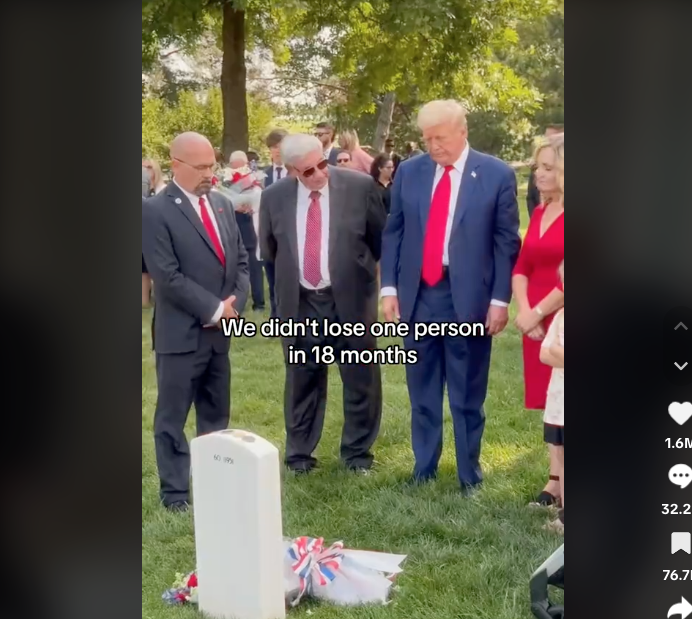Although there is some dispute about the facts, one of the latest brouhahas on the presidential campaign trail concerns former President Donald Trump’s appearance at the Arlington National Cemetery on Aug. 26, 2024. There was an apparent scuffle between a member of the military and a photographer whose access she sought to impede as Trump marked the third anniversary of the suicide attack that killed 13 U.S. troops as U.S. soldiers were leaving Afghanistan.
The officer was seeking to enforce a federal regulation, about which cemetery authorities had informed Trump, that barred partisan activities at the cemetery. The fact that Trump was using the occasion to highlight what he considered to be a policy failure on President Joe Biden’s part certainly gave the event a partisan flavor, heightened by an audio of him during the visit criticizing Biden’s action and by subsequent posts on TikTok.
Some have suggested that Hatch Act regulations prohibiting federal employees from participating some partisan activities might also come into play, but as an ex-president, Trump certainly is not such an employee nor were his cameramen.
Expressing political viewpoints in cemeteries
Those who hope to save the lives of soldiers from the ravages of war are certainly as entitled as anyone to express their views in opposition to military policies that have or might put them there prematurely. Given the hallowed nature of cemeteries and the solemnity that accompanies the burial and care of the dead — and the peace the sites are designed to offer to grieving friends and relatives — it seems reasonable to shield visitors from the commotion that accompanies the expression of political viewpoints.
A strong case can be made that prohibiting partisan events at cemeteries, which are governmental properties, are reasonable “time, place, and manner” restrictions that do not violate the free speech clause of the First Amendment. Moreover, there is no history of opening cemeteries as a public forum for protests.
Supreme Court upheld pickets outside a military funeral
In Snyder v. Phelps (2011), the U.S. Supreme Court did rule that individuals from the Westboro Baptist Church who believed that American tolerance of homosexuality had led to U.S. casualties had the right to picket outside a military funeral because the issue they were highlighting was a matter of public concern. However, it based its decision in part on the fact that the picketers had not disrupted the funeral itself.
The Trump case is complicated by the fact that one or more of the parents whose children were buried had invited Trump to attend. It is also unclear whether family members would have the right to allow the president to be photographed at a part of the cemetery that includes recent grave sites of individuals whose families did not give consent.
Abraham Lincoln gave a famous speech at Gettysburg cemetery
Cemeteries, especially those honoring military heroes, have long been considered hallowed ground. One of the most famous speeches of Greek history, as recorded by Thucydides in his account of the Peloponnesian War, was Pericles’ oration over the annual public funeral of Athenian war dead.
Few if any speeches in U.S. history are better known that President Abraham Lincoln’s speech at the cemetery at the Gettysburg battlefield. One of President Biden’s first acts as president was that of laying a wreath at Arlington’s Tomb of the Unknown Soldier.
If such sites became partisan platforms, they could easily become political battlegrounds rather than places to bury and commemorate war dead. To paraphrase a statement that President Barack Obama made famous, those who give their lives in service to the country do not do so on behalf of Red States or Blue States but on behalf of the United States.
Let the dead rest in peace
Presidential candidates have long wrapped themselves in flags and spoken from rostrums with key American symbols as backdrops, but one might hope that, as long as other venues remain open for protests, families, especially those who have given sons and daughters on behalf of their country, can visit the site of their loved ones free from the sounds and sights of partisan controversy.
Justice Roberts observed in West Virginia State Board of Education v. Barnette (1943) that “Compulsory unification of opinion achieves only the unanimity of the graveyard.”
By distinguishing cemeteries from public sidewalks, we do not violate free speech, but merely allow the silent voices of the dead to rest in peace.
John R. Vile is a political science professor and the dean of the Honors College at Middle Tennessee State University.

